Recent Posts
Managing water damage during fire damage cleanup
12/11/2024 (Permalink)
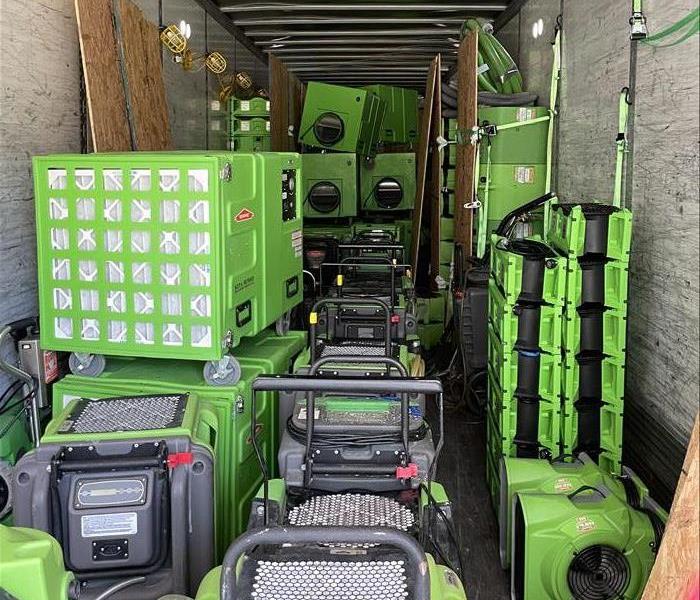 You can trust SERVPRO of Bartow/Lakeland Highlands to handle both fire and water damage.
You can trust SERVPRO of Bartow/Lakeland Highlands to handle both fire and water damage.
When dealing with the aftermath of a fire, water damage often becomes an unexpected but significant issue. Water used to extinguish the flames can result in extensive damage to the property, compounding the challenges of the cleanup process. Properly addressing water damage is critical to restoring your home or business to its pre-fire condition. Here’s how to effectively manage water damage during fire damage cleanup, based on expert insights from SERVPRO® of Bartow/Lakeland Highlands.
Understanding the Dual Challenge of Fire and Water Damage
According to the National Fire Protection Association (NFPA), fire departments respond to an average of 353,100 home structure fires annually in the U.S. Many of these cases involve substantial water usage to extinguish the fire, resulting in widespread water damage. This means that fire damage cleanup often goes hand-in-hand with water extraction and drying.
Steps to Manage Water Damage During Fire Cleanup
Proper management of water damage is essential for a thorough fire damage cleanup process. Below are the key steps to help manage water damage effectively:
- Water Extraction
The first step is to remove as much standing water as possible. Industrial-grade pumps and vacuums can help extract large amounts of water quickly. The sooner water is removed, the less likely it is to seep into structural materials and cause further damage. - Drying and Dehumidification
After water extraction, thoroughly drying the affected areas is crucial. High-powered fans, air movers, and dehumidifiers can speed up the drying process. Targeting moisture hidden within walls, flooring, and other porous materials will help prevent warping and other structural issues. - Cleaning and Sanitizing
Water used during firefighting can bring debris, soot, and contaminants into the property. After drying, deep cleaning and sanitization are necessary to eliminate any residue and odors. SERVPRO uses specialized cleaning products and techniques to restore surfaces to their original condition. - Damage Assessment and Restoration
Evaluate the extent of both fire and water damage to determine which materials can be salvaged and which need replacement. This may involve repairing or replacing drywall, flooring, and insulation.
Why Professional Expertise Matters
Fire and water damage are complex problems that require a professional approach. Restoration experts have the equipment and training needed to assess and address both issues simultaneously. Hiring professionals ensures that no damage is overlooked, which is key to preventing further problems down the line.
By understanding these essential steps for managing water damage during fire cleanup, you can help restore your property effectively and efficiently. Trust SERVPRO of Bartow/Lakeland Highlands to handle both fire and water damage, using industry-leading techniques and expert care to get you back to normal quickly.
Top 5 hidden places mold can be found
11/13/2024 (Permalink)
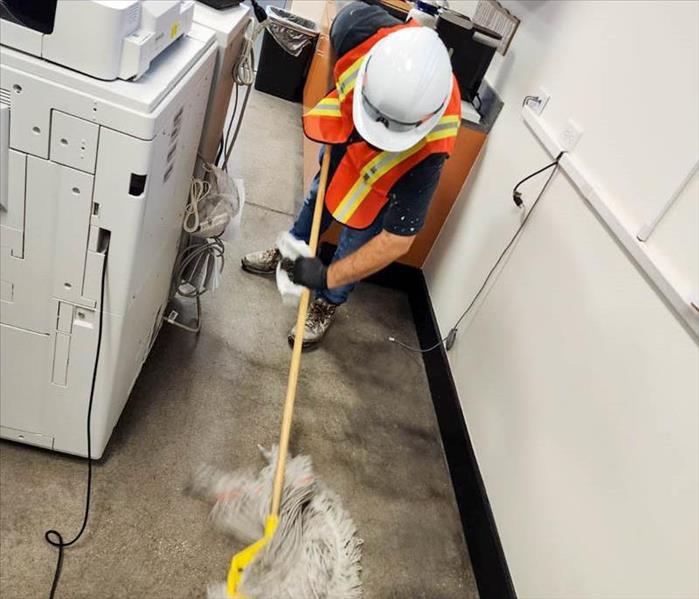 Knowing where mold can hide in your home is the first step toward preventing its spread.
Knowing where mold can hide in your home is the first step toward preventing its spread.
Mold is sneaky, often growing in places you might not expect. While many homeowners know to check areas like the bathroom or basement for mold, some hidden spots are often overlooked, allowing mold to thrive undetected. At SERVPRO® of Bartow/Lakeland Highlands, we’ve seen mold infestations in surprising places. Here are the top 5 hidden places mold can be found in your home.
1. Behind Wallpaper
If your home has wallpaper, especially older or poorly installed wallpaper, there’s a good chance that mold could be hiding behind it. Moisture can get trapped between the wallpaper and wall, creating the perfect environment for mold to grow. Since you can’t see behind the wallpaper, mold can spread for months or even years before it’s discovered.
2. Underneath Carpets and Rugs
Carpets and rugs are another common hiding spot for mold. Even if you’re careful to clean up spills quickly, moisture can seep into the carpet padding, creating a damp, dark environment perfect for mold growth. A study by the Environmental Protection Agency (EPA) found that damp conditions in carpeting can increase the risk of mold growth significantly. If your home has experienced flooding or water damage, mold could easily be growing under your carpet, even if the surface appears dry.
3. Inside HVAC Systems
Your heating, ventilation, and air conditioning (HVAC) system can be a hidden mold hotspot. The condensation created by your air conditioning system provides an ideal environment for mold to grow. Over time, mold spores can spread through the air ducts, potentially contaminating other areas of your home. Regular maintenance and inspection of your HVAC system can help prevent mold growth in this area.
4. Behind Drywall
While it’s easy to spot mold growing on walls, mold can also grow behind drywall, especially after water damage or leaks. If there’s been a leak in your home, even if it seems minor, mold could be growing behind your walls without your knowledge. It’s always a good idea to have a professional inspect any areas that have been exposed to water.
5. In Attics and Crawl Spaces
Attics and crawl spaces are often forgotten areas when it comes to mold inspections. These spaces are usually dark and poorly ventilated, making them prime spots for mold growth. Leaks in the roof or high humidity levels in these areas can cause mold to develop quickly. Make sure to inspect your attic and crawl space regularly for signs of water damage or mold growth.
Proactive Mold Prevention
Knowing where mold can hide in your home is the first step toward preventing its spread. Regular inspections and quick action after any water damage can help keep your home mold-free. If you suspect mold in any of these hidden areas, reach out to SERVPRO of Bartow/Lakeland Highlands for expert mold remediation services. We’re here to protect your home from the hidden dangers of mold.
Reviving Your Electronics: How to Handle Water-Damaged Devices
10/16/2024 (Permalink)
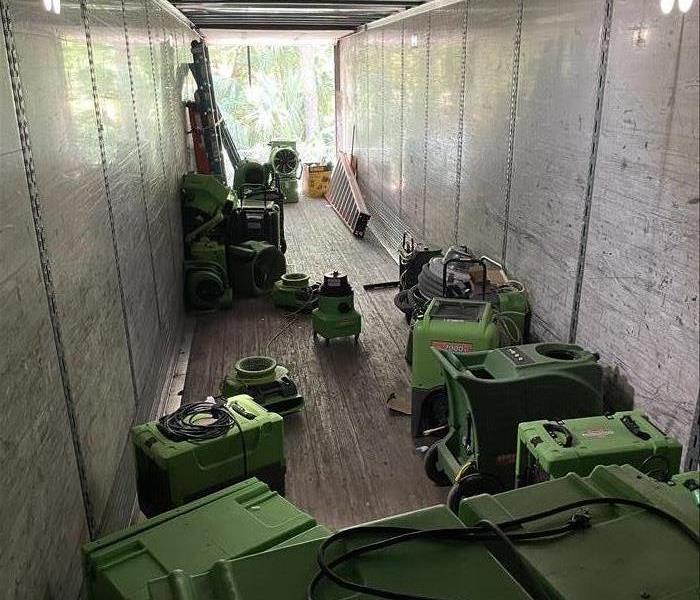 Here’s a guide on how to handle water-damaged electronics to give them the best chance of recovery.
Here’s a guide on how to handle water-damaged electronics to give them the best chance of recovery.
When water damage strikes, it's not just your floors and walls that are at risk—your electronics can also suffer. From smartphones to computers, water-damaged devices are all too common, with some statistics estimating that over 20 percent of electronic failures are caused by water damage and corrosion. If you find yourself facing this problem, don’t panic. Here’s a guide on how to handle water-damaged electronics to give them the best chance of recovery.
Assess the Situation: Safety First
Before attempting to save your water-damaged device, make sure the environment is safe. If the device was plugged in when it got wet, avoid touching it. Water and electricity are a dangerous combination, so always disconnect the power first. Once it’s safe to handle, gently remove the device from the water source.
Do Not Turn It On
It may be tempting to check if your device is still working by turning it on, but resist the urge. Powering on water-damaged electronics can cause short circuits and further damage. Instead, leave the device off until you’re sure it’s completely dry.
Dry the Exterior
Start by drying off the exterior of the device. Use a soft, absorbent cloth or towel to gently wipe away any moisture. Avoid shaking or tilting the device excessively, as this could cause water to spread to internal components.
Remove Batteries and External Parts
If possible, remove any removable parts like batteries, SIM cards, and memory cards. This will help the drying process and prevent further damage. For devices where the battery isn’t easily accessible, consider taking it to a professional rather than attempting to open it yourself.
Air Dry: Patience is Key
The best method for drying water-damaged electronics is to let them air dry. Place the device in a well-ventilated, dry area, ideally with low humidity. Avoid using heat sources such as hair dryers or ovens, as these can warp or damage the internal components.
For small devices like smartphones, placing them in a bag of uncooked rice can help draw out moisture. However, this method isn’t foolproof and is not recommended for larger devices or electronics with more sensitive components.
Consider Professional Restoration
While some water-damaged electronics may recover with DIY methods, others may require professional restoration services. SERVPRO® specializes in restoring water-damaged electronics, using advanced techniques to carefully dry and clean internal components. Professionals have access to tools like desiccant drying chambers and deionized water, which are more effective than home remedies.
Don’t Wait Too Long
The longer water sits inside your device, the more damage it can cause. If your device has been submerged or exposed to water for an extended period, the risk of corrosion increases. Swift action is crucial in minimizing damage.
Final Thoughts
Water-damaged electronics don’t always mean the end of your device. By following these steps and, when necessary, seeking professional help, you can increase the chances of recovery. Whether it’s a smartphone, computer, or other valuable equipment, remember that time is of the essence. If you’re unsure about how to proceed, SERVPRO is Here to Help® with expert restoration services that can bring your devices back to life.
Contact SERVPRO Today
If you’re dealing with water-damaged electronics and need assistance, SERVPRO is just a call away. Our team of professionals is trained to handle all types of water damage, ensuring that your property and devices are restored to their full functionality. Contact us today for reliable and efficient water damage restoration services.
Cleaning and restoring fire-damaged documents and photos
8/14/2024 (Permalink)
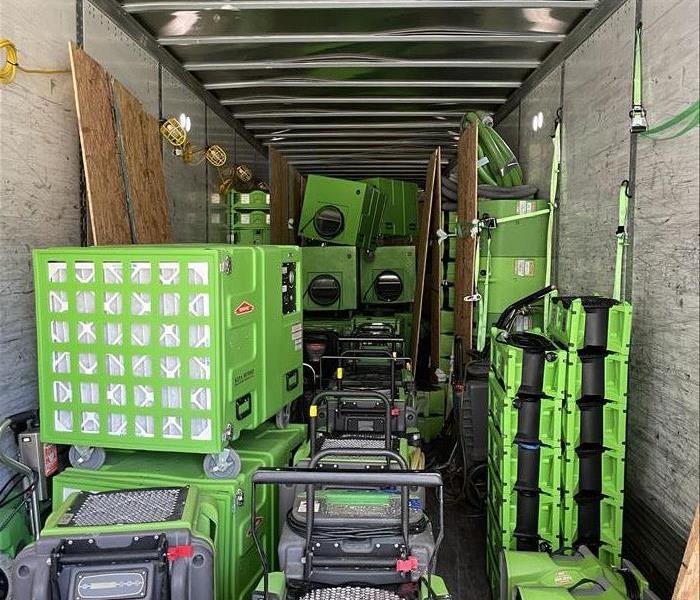 If you need assistance with fire-damaged documents and photos, contact SERVPRO today.
If you need assistance with fire-damaged documents and photos, contact SERVPRO today.
When a fire occurs, the aftermath can be overwhelming. Along with the obvious damage to structures and personal belongings, the loss of important documents and treasured photos can feel particularly devastating. At SERVPRO®, we understand the irreplaceable value of these items and are committed to helping you recover them through our specialized cleaning and restoration services.
Understanding the Impact of Fire Damage on Documents and Photos
Fire damage doesn't just involve the charring of paper; it can include soot accumulation, water damage from firefighting efforts, and smoke odor absorption. These factors can significantly impact the restoration process. Acting quickly and following the right steps is crucial to salvaging your precious documents and photos.
- Safety First: Ensure that it’s safe to enter the premises. If in doubt, wait for professional assistance.
- Gather Items Carefully: Collect damaged documents and photos with clean hands, and avoid touching their surfaces as much as possible to prevent further damage.
- Separate Wet Items: If items are wet, separate them to avoid further damage from sticking together. Place wax paper between photos or documents if needed.
- Keep Items Cool: Store the items in a cool, dry place to prevent mold growth and further deterioration.
SERVPRO’s Specialized Restoration Process
At SERVPRO, we utilize advanced technology and proven techniques to clean and restore fire-damaged documents and photos. Our process includes:
1. Document Drying
The first step in restoration is often drying the documents and photos. We employ specialized methods such as air drying, dehumidification, and vacuum freeze drying to remove moisture without causing additional damage. Vacuum freeze drying, in particular, is highly effective for documents that have been exposed to water.
2. Soot and Smoke Odor Removal
Soot can leave unsightly marks on paper, and smoke can permeate documents and photos with a persistent odor. Our technicians use gentle yet effective cleaning agents and techniques to remove soot and neutralize smoke odors. This might involve surface cleaning with specialized erasers and chemical sponges, or using odor removal techniques like ozone treatment.
3. Digitization
For highly valuable or severely damaged items, digitization is a crucial step. By creating digital copies of your documents and photos, we ensure that you have access to these important items even if they cannot be fully restored. Our high-resolution scanning technology preserves the details and quality of your originals.
4. Deacidification
Paper naturally deteriorates over time due to acidic content. Fire damage can accelerate this process. Our deacidification treatment helps to neutralize acids and prolong the life of your documents and photos.
5. Rebinding and Reprinting
For documents such as books and records, rebinding may be necessary. We offer professional rebinding services to restore the usability and appearance of these items. For photos, high-quality reprinting options are available if the originals cannot be completely restored.
Trust SERVPRO for Your Restoration Needs
Recovering from a fire is a challenging process, but you don't have to face it alone. SERVPRO is here to help you restore your treasured documents and photos with care and expertise. Our comprehensive restoration services are designed to give you peace of mind and help you reclaim your memories.
If you need assistance with fire-damaged documents and photos, contact SERVPRO today. Our experienced professionals are ready to support you every step of the way.
For more information on our fire damage restoration services, visit our website or call us today. Let SERVPRO help you restore what matters most.
How to Handle Fallen Trees and Debris After Southeast Storms
8/5/2024 (Permalink)
 A SERVPRO truck ready to assist!
A SERVPRO truck ready to assist!
Storms in the Southeast can leave behind a significant amount of damage, with fallen trees and debris being a common aftermath. As SERVPRO® professionals, we understand the importance of acting swiftly and safely when dealing with storm damage. Here are some crucial steps to effectively handle fallen trees and debris after a Southeast storm.
Safety
First and foremost, safety is paramount. Before approaching any fallen trees or debris, ensure that the storm has completely passed and there are no immediate dangers, such as downed power lines or unstable structures. If power lines are involved, contact your local utility company immediately and avoid the area until it is deemed safe.
Damage
Once safety is ensured, assess the damage. Take a thorough look at your property to determine the extent of the damage caused by fallen trees and debris. This includes checking your roof, fences, and any outdoor structures for damage. Documenting the damage with photos can be helpful for insurance purposes.
Removal
Next, prioritize removal. Start with smaller debris, such as branches and leaves, which can be cleared away using rakes and shovels. For larger debris, such as tree trunks and heavy branches, you may need specialized equipment. At SERVPRO, we have the tools and expertise to handle even the most challenging debris removal tasks.
Professional Help
For large fallen trees, it is often best to hire professional services. Attempting to remove a large tree on your own can be dangerous without the proper equipment and knowledge. Our team at SERVPRO is trained to handle large-scale tree removal safely and efficiently, ensuring that your property is cleared without risk of further damage or injury.
Secondary Damage
Once the debris is removed, it’s important to address any secondary damage. Fallen trees and debris can cause hidden damage to your property, such as roof punctures, broken windows, or damaged siding. Inspect these areas thoroughly and make necessary repairs to prevent further issues. At SERVPRO, we offer comprehensive restoration services to help you return your property to its pre-storm condition.
Disposal
Proper disposal of debris is another key aspect. Check with your local municipality for guidelines on debris disposal. Many areas have specific regulations regarding the disposal of organic material, and there may be designated drop-off sites or scheduled pick-up services available.
Prevention
Preventative measures can also reduce future storm damage. Regular tree maintenance, such as pruning dead or weak branches, can help minimize the risk of trees falling during storms. Additionally, securing outdoor furniture and structures can prevent them from becoming hazardous debris.
Handling fallen trees and debris after Southeast storms requires a careful and systematic approach. Prioritize safety, assess the damage, and utilize professional services when necessary. By following these steps, you can efficiently manage storm debris and restore your property. For expert assistance, trust the professionals at SERVPRO to help you navigate the aftermath of any storm.
How to Get Rid of Musty Smells In Your House
7/17/2024 (Permalink)
A musty smell in your home can be quite unpleasant and often signals underlying issues. Fortunately, getting rid of musty odors is a manageable task with a few strategic steps. As experts in restoration and cleaning, SERVPRO® is here to guide you through the process to ensure your home smells fresh and clean once again.
Identify the Source
Before you can eliminate musty odors, it's crucial to pinpoint their origin. Common sources include damp basements, hidden mold growth, or water leaks. Check areas that are prone to moisture, such as bathrooms, kitchens, basements, and laundry rooms. Look for signs of water damage or mold, which often accompany musty smells.
Dry Out the Area
Moisture is often the primary cause of musty odors, so drying out the affected area is essential. Use dehumidifiers to reduce humidity levels, particularly in damp areas like basements and bathrooms. Ensure proper ventilation by opening windows and using exhaust fans to help circulate air and speed up the drying process.
Clean and Disinfect
Once the area is dry, the next step is to clean and disinfect. Use a mixture of water and white vinegar or a commercial cleaner to scrub surfaces that may harbor mold or mildew. Pay special attention to hidden spots such as under sinks, behind appliances, and inside closets. For carpets and upholstery, consider using a steam cleaner to penetrate deep into fibers and eliminate any trapped odors.
Use Odor Absorbers
To further neutralize musty smells, place odor absorbers around your home. Baking soda, activated charcoal, and white vinegar are excellent natural options. Simply place bowls of these substances in areas where odors are present. They will help absorb and neutralize lingering smells over time. Additionally, using air purifiers with HEPA filters can help remove airborne particles that contribute to odors.
Inspect and Maintain HVAC Systems
Your HVAC system can also be a culprit in spreading musty odors throughout your home. Regularly change air filters and have your HVAC system inspected and cleaned by professionals. Duct cleaning services can remove dust, mold, and other contaminants that contribute to musty smells.
Regular Maintenance and Prevention
Preventing musty odors requires regular home maintenance. Ensure your home is well-ventilated, particularly in high-moisture areas. Regularly inspect and repair any leaks in your plumbing or roof to prevent water damage. Consider using moisture barriers in basements and crawl spaces to reduce humidity levels. Keep your home clean and dry to prevent mold and mildew from developing.
Seek Professional Help When Needed
If the musty smell persists despite your efforts, it might be time to seek professional assistance. SERVPRO offers comprehensive cleaning and restoration services to address the underlying issues causing musty odors. Our team of experts can thoroughly inspect your home, identify problem areas, and provide effective solutions to eliminate odors and prevent future occurrences.
By following these steps, you can successfully rid your home of musty smells and create a more pleasant living environment. For more expert advice or assistance with odor removal, contact SERVPRO today. We are here to help you restore and maintain a fresh, clean home.
Water Damage in Commercial Kitchens: Recovery and Clean-Up Tips
6/12/2024 (Permalink)
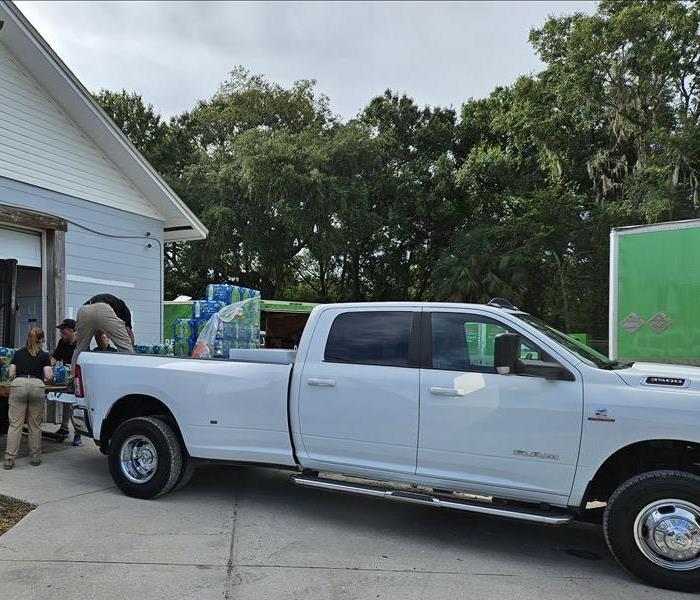 With the right knowledge and prompt action, you can minimize the downtime and get your commercial kitchen up and running again.
With the right knowledge and prompt action, you can minimize the downtime and get your commercial kitchen up and running again.
Accidents happen, and in the fast-paced environment of a commercial kitchen, water damage is a common occurrence. Whether it's a burst pipe, a leaky dishwasher, or flooding from heavy rain, water damage can disrupt your business operations and lead to costly repairs. However, with the right knowledge and prompt action, you can minimize the downtime and get your commercial kitchen up and running again.
Identify the Source of the Water Damage
The first step in addressing water damage is to identify the source. Quickly locate and shut off the water supply to prevent further damage. Common sources of water damage in commercial kitchens include faulty plumbing, damaged appliances, and weather-related incidents. By identifying the source, you can better understand the extent of the damage and take appropriate action.
Prioritize Safety
Before entering the affected area, make sure it is safe to do so. If there are any electrical appliances, turn off the power immediately to avoid the risk of electrocution. In case of severe flooding, it may be necessary to evacuate the premises until professional help arrives.
Contact a Professional Commercial Restoration Service
Commercial water damage requires professional expertise to ensure thorough and efficient recovery. Contact a reputable commercial restoration service like SERVPRO® as soon as possible. SERVPRO specializes in commercial water damage restoration and can help you with the cleanup process, minimizing the impact on your business.
Document the Damage and Notify Insurance
Take photos and videos of the water damage before any restoration work begins. This documentation will be useful when filing an insurance claim. Notify your insurance company promptly to begin the claim process and ensure that you have all the necessary paperwork in order.
Remove Standing Water
If it is safe to do so, begin the water extraction process to remove standing water from the affected areas. Use mops, buckets, or wet vacuums to remove as much water as possible. The faster you can remove the water, the lower the risk of secondary damage, such as mold growth.
Dry and Dehumidify
After water extraction, it is crucial to thoroughly dry the affected areas using industrial-grade fans and dehumidifiers. This step is essential to prevent the growth of mold and mildew, which can pose health risks to occupants and cause further damage to your commercial kitchen.
Clean and Sanitize
Once the affected areas are dry, cleaning and sanitization are necessary to ensure a safe and hygienic environment. Use commercial-grade cleaning products to remove any remaining contaminants and bacteria. Pay special attention to hard-to-reach areas, such as corners and crevices, where mold can easily thrive.
Repair and Restore
Once the cleanup process is complete, it's time to repair and restore any damaged structures, equipment, or fixtures. A professional commercial restoration service like SERVPRO® will have the expertise and resources to handle repairs efficiently, getting your commercial kitchen back to its original state.
Prevention is Key
To minimize the risk of future water damage, it's essential to implement preventative measures. Regularly inspect plumbing systems, appliances, and the building's exterior for any signs of damage or deterioration. Promptly address any leaks or issues to prevent them from escalating into larger problems.
In conclusion, water damage in commercial kitchens can disrupt your business and cause significant financial loss. By following these recovery and clean-up tips, along with the assistance of a professional commercial restoration service like SERVPRO, you can mitigate the damage and restore your commercial kitchen quickly. Remember, acting promptly is crucial in preventing secondary issues like mold growth. Don't hesitate to reach out to expert help for efficient and reliable commercial water damage restoration services.
Everything You Need to Know About Coastal Flooding and Storm Surge
5/15/2024 (Permalink)
Coastal flooding and storm surge are significant concerns for residents living in coastal areas, especially during hurricane season. Understanding these phenomena is crucial for homeowners to adequately prepare and protect their properties. Let's delve into the basics of coastal flooding and storm surge to shed light on these natural hazards.
What is Coastal Flooding?
Coastal flooding occurs when water from the ocean inundates coastal areas, often due to a combination of factors such as heavy rainfall, high tides, and storm surges. It can lead to extensive property damage, erosion of beaches and dunes, and pose risks to life and safety. Coastal flooding is a common occurrence during hurricanes, tropical storms, and nor'easters, making it essential for coastal residents to be prepared.
Understanding Storm Surge
Storm surge is a significant contributor to coastal flooding during severe weather events, particularly hurricanes. It refers to the abnormal rise in seawater level along the coast caused by the strong winds and low atmospheric pressure associated with hurricanes. As a hurricane approaches land, its powerful winds push water toward the shore, resulting in a surge of seawater that can inundate coastal communities.
Factors Affecting Storm Surge
Several factors influence the severity of storm surge, including the intensity and size of the hurricane, the angle of approach to the coast, and the shape of the coastline. Low-lying areas, narrow bays, and estuaries are particularly vulnerable to higher storm surges due to their topography. Additionally, the timing of high tide can exacerbate the impact of storm surge, leading to more extensive flooding and property damage.
Preparing for Coastal Flooding and Storm Surge:
To mitigate the risks associated with coastal flooding and storm surge, homeowners in coastal areas should take proactive measures to prepare for these hazards. This includes:
- Create a comprehensive emergency plan that outlines evacuation routes, emergency contacts, and procedures for securing your property.
- Secure outdoor furniture, equipment, and valuables to prevent them from being swept away or damaged during flooding. Consider installing flood barriers, sandbags, or flood gates to protect vulnerable entry points, such as doors and windows.
- Elevate your home or building above the base flood elevation to reduce the risk of flood damage. Consider retrofitting your property with flood vents or elevating mechanical systems, such as HVAC units, to minimize potential damage.
- Purchase flood insurance to protect your property and belongings from flood-related losses. Standard homeowners' insurance policies typically do not cover flood damage, so it's essential to obtain coverage through the National Flood Insurance Program (NFIP) or a private insurer.
- Stay informed about weather forecasts, storm warnings, and evacuation orders issued by local authorities. Monitor updates from the National Hurricane Center and follow their recommendations for storm preparation and evacuation.
Coastal flooding and storm surge pose significant threats to coastal communities, but with proper preparation and planning, homeowners can minimize the risks and protect their properties. By understanding the fundamentals of these natural hazards and taking proactive measures to mitigate their impact, residents can enhance their resilience and safety in the face of coastal storms.
Best Practices for Preventing Future Fire Damage in Your Home
4/17/2024 (Permalink)
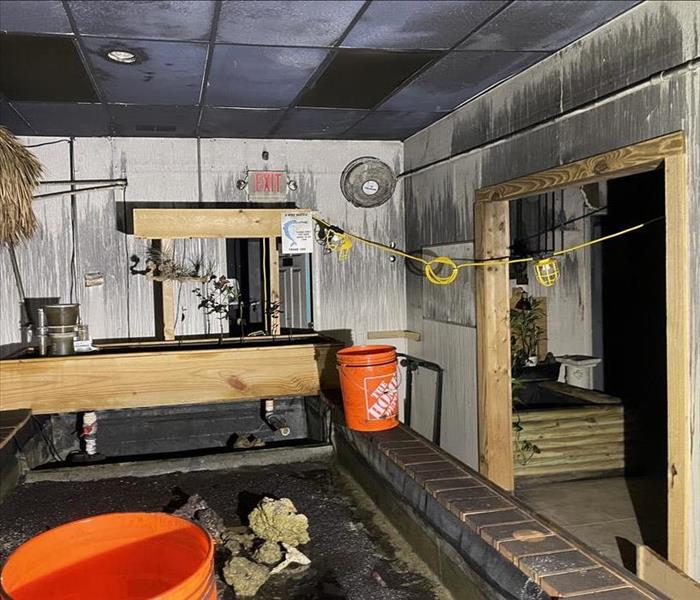 In this blog, we will explore essential best practices for preventing future fire damage in your home.
In this blog, we will explore essential best practices for preventing future fire damage in your home.
Preventing fire damage is crucial for the safety and well-being of your home and family. While fire damage restoration experts like SERVPRO® can help restore your property after a fire incident, implementing best practices for fire prevention is the most effective way to protect your home. In this blog, we will explore essential best practices for preventing future fire damage in your home. By following these practices, you can minimize the risk of fire, safeguard your property, and avoid the need for extensive fire damage restoration and remediation efforts.
Install Smoke Alarms
Equipping your home with working smoke alarms is essential for early fire detection. Install smoke alarms on every level of your home, including inside bedrooms and outside sleeping areas. Regularly test and replace the batteries in these alarms to ensure they are functioning correctly. Smoke alarms can provide vital early warning signals that can save lives and minimize property damage in the event of a fire.
Practice Safe Cooking Habits
Cooking-related fires are a common cause of residential fires. To prevent fire damage in the kitchen, maintain safe cooking habits such as:
- Never leave cooking unattended, especially when using stovetops or ovens.
- Keep flammable materials, such as kitchen towels, away from open flames.
- Clean cooking surfaces regularly to remove built-up grease and prevent grease fires.
- Have a fire extinguisher readily available in the kitchen and know how to use it properly.
Exercise Caution with Heating Systems
Heating systems, such as fireplaces, wood-burning stoves, and space heaters, require careful use to prevent fire damage. Follow these guidelines:
- Keep flammable materials at least three feet away from heating equipment.
- Use sturdy screens to prevent embers from escaping fireplaces.
- Properly maintain and clean chimneys and flues for efficient and safe operation.
- Turn off space heaters before leaving the room or going to bed.
Handle Electrical Appliances and Cords Safely
Electrical malfunctions and improper handling of appliances can lead to devastating fires. To prevent fire damage related to electrical issues, practice these precautions:
- Do not overload electrical outlets or extension cords.
- Replace frayed or damaged cords and wires promptly.
- Unplug appliances when not in use or when you leave the house.
- Use surge protectors to safeguard sensitive electronics.
Be Mindful of Candle Usage
Candles can create a cozy atmosphere, but they pose a fire risk if not used safely. Consider these precautions when using candles:
- Never leave candles unattended or within reach of children or pets.
- Place candles in sturdy holders on stable surfaces away from flammable materials.
- Blow out candles before leaving a room or going to sleep.
Develop a Fire Escape Plan
Having a well-thought-out fire escape plan is essential for every household. Create a plan that includes multiple escape routes, a designated meeting point outside the home, and the practice of regular fire drills. Ensure that all family members are familiar with the plan and know how to exit the home safely in case of a fire.
Keep Fire Safety Equipment Accessible
To prevent fire damage, it is vital to have the necessary fire safety equipment readily available. Maintain functional fire extinguishers on each level of your home, especially in high-risk areas like the kitchen, garage, and workshop. Additionally, ensure that fire extinguishers are easily accessible and regularly checked for proper functionality.
Preventing future fire damage in your home requires proactive measures and adherence to best practices. By installing and maintaining smoke alarms, practicing safe cooking habits, exercising caution with heating systems, handling electrical appliances and cords safely, being mindful of candle usage, developing a fire escape plan, and keeping fire safety equipment accessible, you can significantly reduce the risk of fire incidents. While fire damage restoration experts like SERVPRO are prepared to assist in the aftermath of a fire, prevention remains the most effective approach to protect your home and loved ones. Adopt these best practices for fire prevention, and enjoy the peace of mind that comes with knowing you have taken proactive steps to safeguard your home from the devastating effects of fire.
Black Mold: Myths vs. Facts
3/13/2024 (Permalink)
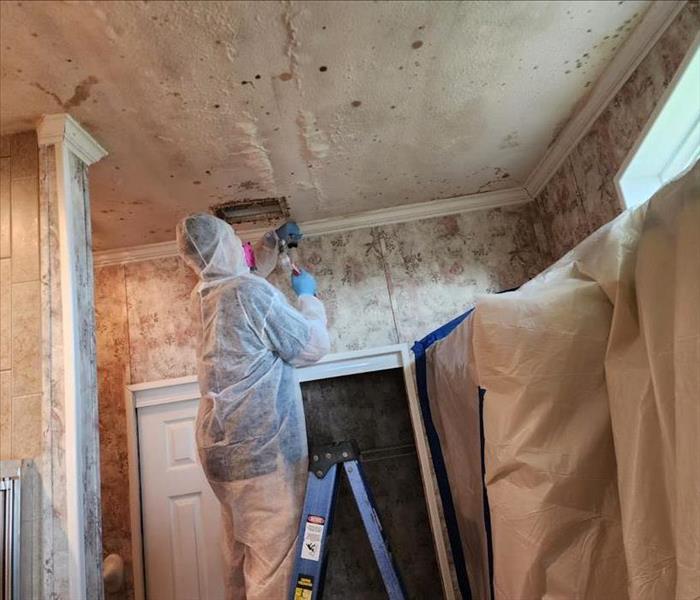 In this blog, we will explore common myths surrounding black mold and provide factual information to dispel any misconceptions.
In this blog, we will explore common myths surrounding black mold and provide factual information to dispel any misconceptions.
Black mold, also known as Stachybotrys chartarum, is a type of mold that has gained attention and generated various myths over the years. It is important to separate fact from fiction when it comes to this form of mold. In this blog, we will explore common myths surrounding black mold and provide factual information to dispel any misconceptions.
Myth 1: All Black Mold is Toxic
Not all black molds are inherently toxic. The term "black mold" is often used to refer to Stachybotrys chartarum specifically. While this particular mold can produce mycotoxins, it is essential to recognize that not all black molds are toxic. The color alone is not an indicator of toxicity. Professional assessment and testing can help determine the species and potential risks associated with mold in your home.
Myth 2: Black Mold is Always Visible
Black mold can certainly be visible on surfaces, presenting as a dark black or greenish-black growth. However, it can also grow in hidden areas, such as behind walls, inside ductwork, or under carpets. Just because you do not see black mold, it does not mean you are immune from its presence and potential damage. Musty odors or unexplained health symptoms may indicate hidden mold growth.
Myth 3: Bleach Can Effectively Eliminate Black Mold
While bleach can help remove mold stains on non-porous surfaces, it is not an effective solution for eliminating black mold entirely. Bleach is mostly water, and when applied to porous materials like drywall or wood, it can actually promote mold growth by providing moisture. Moreover, bleach cannot penetrate deeply into materials, making it ineffective in addressing hidden or deeply rooted mold growth. Professional mold restoration services are recommended for effective black mold removal and remediation.
Myth 4: You Can Remove Black Mold Yourself
Small mold outbreaks on non-porous surfaces may be safely addressed by homeowners with appropriate protective gear and cleaning agents. However, black mold remediation is a complex process that may require professional assistance. Trained professionals have the expertise, experience, and specialized equipment to handle black mold effectively. They can thoroughly assess the situation, contain the affected area, safely remove mold, and address the underlying causes to prevent further growth.
Myth 5: Once Black Mold is Removed, It Will Not Return
Completely eliminating black mold requires more than just removing visible growth. It is crucial to address the underlying source of moisture to prevent its return. Without identifying and rectifying the moisture problem, black mold is likely to resurface. Professionals specializing in mold restoration services can not only remove black mold but also implement preventive measures to minimize the risk of its recurrence.
Separating myths from facts about black mold is essential for homeowners dealing with mold damage. Understanding the misconceptions surrounding black mold can help you make informed decisions and take appropriate actions to safeguard your home. While black mold can be a serious issue, it is important to consult with professionals like SERVPRO® who offer specialized mold restoration services. Their expertise and proven solutions ensure that black mold is effectively eliminated, and preventive measures are implemented to restore and protect your home.



 24/7 Emergency Service
24/7 Emergency Service



